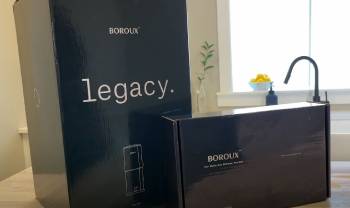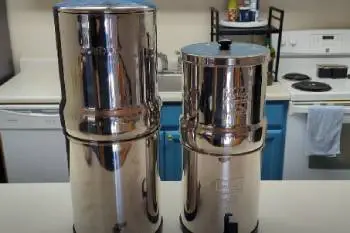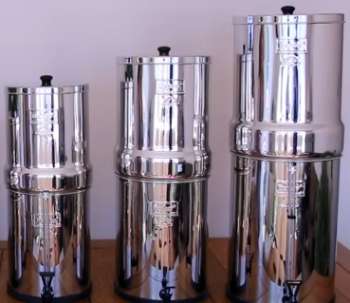If you’re torn between the Boroux and Berkey water filter systems, you’re in the right place.
I’ve used both, and I’ll walk you through my experience, breaking down the real differences, advantages, and concerns.
Whether you’re just curious or seriously considering which one deserves a spot on your counter, this comparison should make your decision easier.
Boroux Vs. Berkey Filter Comparison Table
| Feature | Boroux Filter | Berkey Filter |
| Filtration Technology | Activated Coconut Carbon Core | Black Berkey Elements with optional fluoride |
| Removes Fluoride? | No (without extra filter) | Yes (with PF-2 fluoride filters) |
| Material Build | Stainless steel, glass dispenser option | Polished stainless steel |
| Capacity Range | 2.25 gallons (standard) | 1.5 to 6 gallons (depending on model) |
| Filter Lifespan | Approx. 1,000 gallons per filter | Approx. 3,000 gallons per element |
| Certifications | Independently tested | No NSF/ANSI certification |
| Price Range | Moderate | Premium |
| Available Accessories | Limited | Wide range (stand, spigot, LED base) |
| Ease of Use | Easy setup, gravity-based | Slight learning curve |
| Legal Controversies | None | Recent EPA-related restrictions |
My Experience with Both Filters

I started out with a Berkey. It looked sleek in my kitchen, and I liked the gravity-fed simplicity.
After weeks of use, I noticed how fresh the water tasted. I live in an area with heavily chlorinated municipal water, so the difference was night and day.
Then, a friend recommended Boroux. I was skeptical—mostly because I’d already invested in Berkey—but I gave it a shot.
Boroux’s filters are a bit more affordable and surprisingly competent for everyday filtration. It didn’t remove fluoride, though, which Berkey can (with an add-on). That mattered to me.
But then came the headlines. Lawsuits, restrictions, and questions started popping up around Berkey.
That made me pause and revisit Boroux more seriously. Here’s how the two stack up across different angles.
Pros and Cons of Boroux Filters

Pros:
Affordable pricing makes it accessible.
Sleek design with optional glass dispenser adds style.
Easy installation—just pop in the filters and start.
Great for improving taste and removing chlorine.
BPA-free construction for peace of mind.
Cons:
Does not filter out fluoride unless paired with external adapters.
Filter lifespan is shorter than Berkey’s.
Limited accessories or customization.
Fewer lab reports publicly available compared to others.
Pros and Cons of Berkey Filters

Pros:
Exceptional filtration power, including heavy metals and fluoride.
Huge filter lifespan—up to 3,000 gallons per element.
Customizable models and sizes for different households.
Removes bacteria, viruses, and pharmaceutical residues.
Popular among off-grid and emergency preparedness users.
Cons:
Premium price can be off-putting.
Recently under regulatory scrutiny in the U.S.
Some users report difficulty priming filters.
Lacks formal NSF/ANSI certification despite high performance.
Filtration Performance: What Really Gets Removed
Berkey takes the lead here. Its Black Berkey filters remove over 200 contaminants, including heavy metals like lead, volatile organic compounds (VOCs), bacteria, and even viruses. If you’re concerned about fluoride, Berkey’s PF-2 filters offer that extra layer of protection.
Boroux performs well for daily needs. It removes chlorine, bad taste, odors, and common sediments using activated coconut carbon. It’s good, but not aggressive enough to tackle fluoride or viruses. It’s fine if your tap water is decent but not ideal for sketchy sources.
Design and Build Quality
Both filters are built well, but they appeal to different styles. Berkey uses polished stainless steel, giving it that serious, industrial look. It’s sturdy and feels like a tank. My unit survived a kitchen move with zero damage.
Boroux is a bit more modern, especially with its optional glass dispenser. It feels lighter and more minimalistic. I liked how it looked on my counter—it didn’t scream “prepper gear” like Berkey sometimes does.
Durability-wise, Berkey wins. But Boroux has an edge in aesthetics for smaller or modern kitchens.
Maintenance Tips for Both Products

1. Clean the filters regularly: Both Boroux and Berkey recommend periodic cleaning of the filter elements to ensure optimal performance. For Berkey, scrub the black carbon filters with a Scotch-Brite pad every month or when water flow decreases. With Boroux, gently rinse and brush the ceramic filters every few weeks, especially if you’re using well water or hard municipal supplies.
2. Sanitize all chambers: Every month or two, disassemble the system and thoroughly clean the upper and lower chambers using warm water and a mild, non-abrasive dish soap. Avoid harsh chemicals that may damage stainless steel or leave residue that affects water taste. Dry all parts completely before reassembly to prevent mold buildup.
3. Avoid soap on filter elements: Never use dish soap directly on the filters themselves—this applies to both brands. It can clog pores or degrade the filtration material. Only use water and, in Berkey’s case, their priming button or pump to flush the elements if needed.
4. Store dry during long gaps: If you’re not using the filter for more than four days, remove the elements, allow them to dry completely, and store them in a breathable container. For Berkey, make sure the black filters are bone-dry before sealing them in a zip bag with paper towels. For Boroux, wrap ceramic filters in clean cloth and keep them in a cool, dry place.
5. Check for filter life span: Keep track of the gallons each filter type is rated for—Berkey black filters typically last 3,000 gallons per element, while Boroux varies between 1,000–2,000 gallons depending on the model. Write down your usage date or use a filter tracking app to stay on top of replacements.
6. Prevent freezing damage: Never let water sit inside the unit in freezing temperatures. Whether you’re camping with a Berkey or storing your Boroux system outdoors, frozen water can crack the filters and render them useless. Always drain the system in cold conditions.
Also Read: Hydroviv Vs. Berkey Water Filter Systems (2025)
Setup and Maintenance
Installing Boroux was easy. I followed the instructions, ran the filters with a few flush cycles, and it was ready. Cleaning is also simple—no weird tools or special solutions required.
Berkey’s setup was a bit more involved. Priming the filters took patience. There’s a technique to it, and the learning curve can throw off first-time users. But once it’s set, it runs like a champ.
As for maintenance, Berkey filters last longer but need more care. You have to clean them every few months to keep flow rate consistent. Boroux’s filters are quicker to replace but easier to maintain in the short term.
Capacity and Household Suitability
Berkey comes in multiple sizes—Travel Berkey (1.5 gallons) up to Crown Berkey (6 gallons). If you have a large family or use a lot of filtered water, Berkey offers the flexibility you need.
Boroux offers a standard size around 2.25 gallons. It’s ideal for singles or small households but may feel small if you consume a lot of water daily.
It’s more of a compact unit than a long-term solution for large families.
Taste and Water Clarity
Both filters significantly improved the taste of my tap water. Chlorine was gone, and the water tasted fresher. Boroux gave a very clean, crisp profile, while Berkey produced a smooth, almost “soft” taste.
If taste is your top priority, both do a great job. But Berkey’s broader contaminant removal gave me a sense of added peace with every sip.
Cost of Ownership
Upfront, Berkey costs more. Add fluoride filters, and the price climbs further. But the filter longevity offsets that over time. You replace filters less frequently, which saves money in the long run.
Boroux has lower startup costs. Replacement filters are cheaper too—but they don’t last as long. Over a span of three years, Berkey becomes more economical if you’re filtering a lot of water.
Certification and Lab Testing
Here’s where it gets complicated. Berkey has been independently tested but doesn’t carry official NSF/ANSI certification. That’s raised eyebrows, especially now with regulatory scrutiny.
Boroux has some third-party testing results, but not extensive ones. It’s marketed as safe and effective, but lacks large-scale, transparent certifications. If you’re someone who puts a lot of weight on formal testing, neither brand will fully satisfy—but Berkey’s history of real-world testing wins marginally.
Legal and Regulatory Issues
This section can’t be ignored. Berkey has recently been under the spotlight for regulatory reasons.
The EPA labeled it a pesticide device due to how it’s marketed, creating sales restrictions and legal complications. That’s made some retailers pull Berkey from shelves.
Boroux hasn’t had any such drama. It flies under the radar, for better or worse. There’s no public lawsuit, no bans, and no recalls to speak of.
Also Read: Doulton Water Filter Vs. Berkey Water Filter (2025)
Frequently Asked Questions (FAQs)
The EPA labeled Berkey filters as pesticide devices due to their claims about microorganism removal, triggering restrictions. It’s not a shutdown, but certain sales and imports are blocked.
No. Boroux filters are not designed to attach or work with Berkey’s PF-2 fluoride filters.
Yes, they’re BPA-free and made with food-grade materials. However, always buy directly from verified sellers to avoid knock-offs.
The lawsuit centers around regulatory claims and sales restrictions imposed by the EPA. It’s about classification—not about faulty product performance.
Final Thoughts
If you want the most thorough filtration and don’t mind a higher price or some legal gray areas, Berkey still leads in performance. It’s the go-to for families, off-grid users, or those with questionable tap water.
But if you’re looking for something sleek, affordable, and simple, Boroux does the job well—especially if fluoride isn’t a concern for you.
Personally, I’ve kept both. Berkey is my long-haul workhorse, and Boroux is my stylish, quick-use filter in the home office.
Whatever your priorities—budget, design, contaminant removal—you now have a clear picture. You’re better equipped to choose the one that fits your life best.
